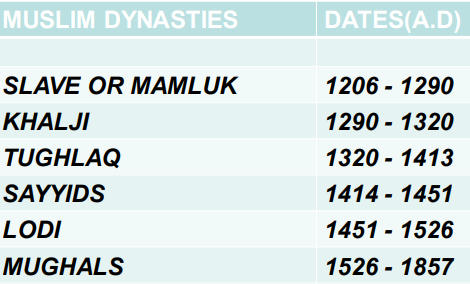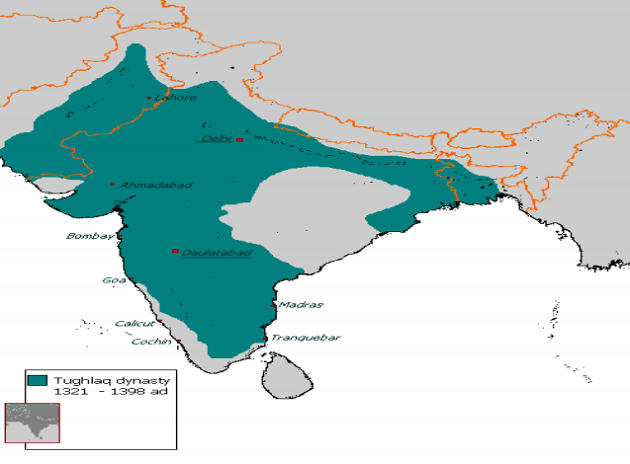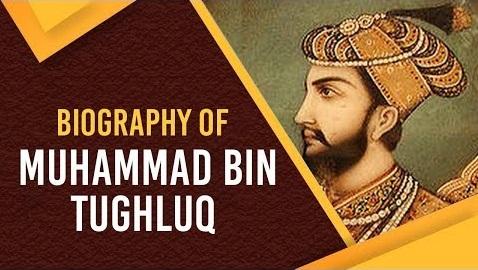Table of Contents
MUSLIM DYNASTIES


WISE FOOL KING
- Muhammad bin Tughluq was born to Ghiyas-ud-din Tughlaq, who was in turn the son of a Turkic slave father and a Hindu Indian concubine mother.
- Muhammad Bin Tughlaq just after the death of his father, declared himself as the Sultan in Tughlaqabad and after staying 40 days there.
SULTAN
- He was highly educated and was well versed in Arabic and Persian language. He was well read in the subjects of religion, philosophy, astronomy, mathematics, medicine and logic .He was also a good calligraphist,he was an excellent commander.
- He was highly ambitious and was a man of high moral character. He was very much faithful to his own religion and obeyed the religious rites and was regular at his daily prayers.
SULTAN
- In spite of high qualification and knowledge, Sultan Muhamad-bin- Tughlaq suffered from certain qualities of hastiness and impatience that is why many of his experiments failed and he has been called an ill starred idealist.
- Muhammad-bin-Tughlaq ascended the throne just three days after the sudden death of his father, Giyasuddin Tughlaq. Right from the beginning of his rule; he decided to take some bold reformative measures for the improvement as well as safeguard of the country.
DOMESTIC REFORMS
- REVENUE POLICY
- He wanted to make an assessment of the total income and expenditure of the country. He therefore issued an ordinance for the compilation of a register showing the incomes and expenditures of the provinces.
- It was definitely a praise-worthy step of Muhammad-binTughlaq
TAXATION(1525 – 27)
- No doubt the Doab region between the Ganga and Yamuna was highly fertile but hike in the tax came at a wrong time and assessment of revenue was not based on the factual report.
- Peasants were paying the land revenue tax almost the half of the produce since the time of Ala-ud-din Khilzi. Peasants unwilling and unable to pay tax, fled away from the villages and Muhammad-bin-Tughlaq took harsh measures to capture and punish them.
- Muhammad-bin- Tughlaq realized the problem but it was too late. He made all possible efforts to restore them to their houses and supplied all sorts of agricultural helps and loans to revive their economic standard.
DIWAN-I-KOHI
- The department’s main work was to find out uncultivated lands and make all sorts of arrangements for the cultivation of horse lands.
- A large number of peasants were engaged in the work of cultivation. They were supplied with all sorts of agricultural instruments and seeds. They were asked to grow different crops in rotation.
- In spite of this, the scheme failed miserably. The target amount of production could not be achieved.
TRANSFER OF THE CAPITAL(1327)
- Transfer of the capital from Delhi to Devagari (Daultabad) has the most controversial step of Muhammad-bin-Tughlaq.
- He ordered his courtiers, officers, leading men including Sufi saints as well as all people of Delhi to shift to Devgiri. Though the inhabitants of Delhi were unwilling to leave their dear land of birth, they had to obey the Sultan’s order. Nobody was allowed to stay at Delhi.
- The distance from Delhi to Daulatabad (Devagiri) was nearly 1500 km. The Sultan had set up rest houses on the way to help the travellers.
TRANSFER OF THE CAPITAL(1327)
- After a couple of years, Muhammad Tughlaq decided to abandon Daulatabad because he realized the fact that just as he could not control the South from Delhi in the same way he could not control North from Daulatabad.
- He changed his mind and again in 1335 A.D. he ordered the retransfer of the Capital to Delhi and asked everybody to go back to Delhi.
INTRODUCTION OF TOKEN CURRENCY(1329 – 30)
- During the time Muhammad-bin-Tughlaq a huge quantity of coins was required for various transactions and there was a dearth of gold and silver coins in the country.
- Considering all those factors he decided to introduce a bronze coin which was to have the same value as the silver tanka.
- Muhammad- bin-Tughlaq introduced bronze coins in place of silver and gold but there remained certain defects which made him a big failure in this experiment.
KHURASAN EXPEDITION
- Muhammad-bin-Tughlaq’s experiments were not confined to internal matters only; it was also down with external affairs. His Khurasan project was the first of them. In-order-to fulfill his ambition of a great conqueror; he planned to conquer the kingdom of Khurasan which was then ruled by Iraq.
- He spent nearly three lakhs of rupees for this mission. But this project was dropped because he did not get the help of the Persian emperor who had assured him to help in this mission.
DEATH
- He had profound knowledge in logic, philosophy, mathematics astronomy and physical sciences. He was well versed in Arabic and Persian language and literature. He was a lover of music and fine art.
- Tughluq died in 1351 on his way to Thatta, Sindh while campaigning in Sindh against taghi,a turkish slave tribe.






















 WhatsApp
WhatsApp